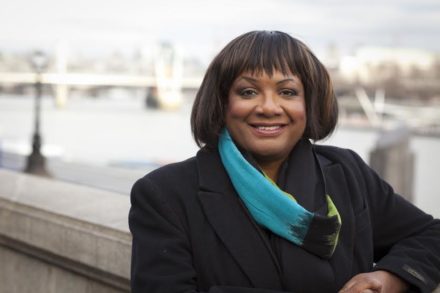October is Black History month in the UK and what better way to begin the month-long celebration than to have the first black woman represent a party in parliament.
For the month’s first Prime Minister Question time, veteran MP and UK’s shadow home secretary, Diane Abbott stood in for Jeremy Corbyn.
She represented the Labour Party in the weekly question showdown with the Conservative Party that takes place every Wednesday in the UK parliament.
The Labour party leader, in a tweet on Tuesday, made the announcement for Abbott’s Prime Minister Question (PMQ) time takeover, highlighting that it would occur during Black History Month.
This is a bold move by Corbyn as he is anti-Brexit and the Brexit referendum saw an intensification of the racially motivated attacks on blacks and other ethnic minorities.

He tweeted and uploaded a photo of young Abbott who has represented her Hackney North and Stoke Newington seat since 1987. The tweet read,
“This #BlackHistoryMonth we’re inspired by the struggles of black campaigners, including the first black MPs elected in 1987”.
“Tomorrow one of those pioneering MPs, a child of the Windrush Generation, Diane Abbott, will be the first black person to represent their party at #PMQs.”
Abbott has been very vocal about the racism faced by the ethnic minorities in the country, especially for those in politics amid the Brexit brouhaha the country is currently facing.
In a 2017 article to The Guardian, Abbott said:
“I went into politics to create space for women and other groups who have historically been treated unfairly. Once, the pushback was against the actual arguments for equality and social justice. Now the pushback is the politics of personal destruction.
“This is doubly effective for opponents of social progress. Not only does it tend to marginalise the female “offender”, but other women look at how those of us in the public space are treated and think twice about speaking up publicly, let alone getting involved in political activity.
“Who needs their intelligence, motivation and personal appearance to be savaged in the tabloids and online? Better to stay silent or say whatever the men are saying.
“If online commentary and the rise in racist incidents are anything to go by, there is a danger that Brexit could give some people permission to express sentiments that are anything but progressive and internationalist.
“Thirty years ago, I entered parliament to try and be the change I wanted to see. Despite the personal attacks and the online abuse, that struggle continues.”
Abbott, on Wednesday, went head to head with Dominic Raab, UK’s foreign secretary as Prime Minister Boris Johnson is in Manchester attending to other party duties. She interrogated Raab on several issues bothering on Brexit and women rights.

“Whether it’s women members in this House, women claiming benefits, women’s reproductive rights in Northern Ireland, and the failure to support women workers at Thomas Cook, isn’t this a Government letting women down?” Abbott questioned.
She went on further to say, “The foreign secretary hasn’t mentioned the fact there are over 600,000 more women and girls in poverty now than in 2010 … It seems to me that Tory Members of Parliament may on occasion make women their leaders, but they need to learn how to treat them less cruelly.”
Her time in parliament received mixed reviews on Twitter but most comments were positive as she was commended for holding the forts for the black community, women and the underrepresented in general.
According to ABC News, Abbott also made history as the first black woman to have been elected into the House of Commons in 1987 at the time when there were only 49 women in parliament out of the 650 MPs.
Granting an interview on this historic victory to The Guardian in 2012, Abbott admitted her biggest challenge has been racism but never has she let it prevent her from executing her duties as an MP.










